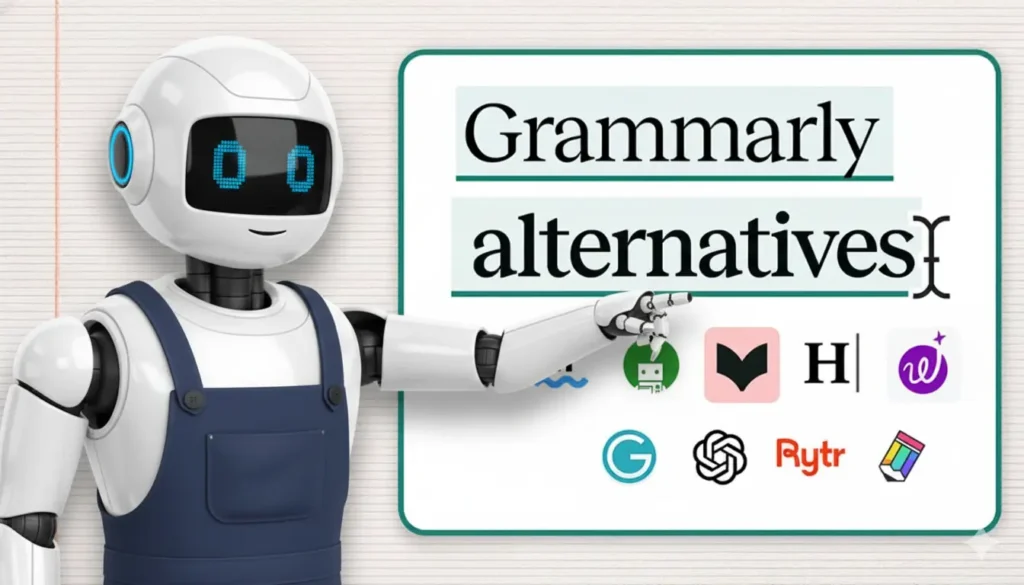Are you tired of Grammarly’s limits holding back your writing flow? Many folks love its quick fixes, but it can feel like a one-size-fits-all fix that misses the mark for deeper needs. Let’s explore nine strong Grammarly alternatives that shine in ways Grammarly doesn’t, helping you craft sharper, more personal work without the hassle.
Introduction: Moving Beyond Grammarly for Superior Writing Results
Why Writers Seek Grammarly Alternatives
Grammarly draws crowds with its grammar tweaks and AI writing help. Yet, its free plan skips key perks like style tweaks and plagiarism scans. Paid plans cost a lot, with no one-time buy option. You also miss deep dives into research or long pieces. Worst, it uses your words to train its AI unless you opt out in settings. These gaps push writers to seek better fits.
The Promise of Specialized Writing Assistants
Special tools beat general ones by targeting your style. Some guard privacy tight. Others boost creative sparks or handle many languages. This guide spotlights nine options. Each fits niches like fiction or business notes. You’ll find picks that match your goals, from quick edits to full rewrites.
Section 1: Understanding the Need for Specialized Editing Software
Common Downsides of Generalist Tools Like Grammarly
Tools like Grammarly handle basics well, but they fall short on depth. Subscriptions run high, often over $100 a year for full access. The free tier locks out plagiarism checks and style fine-tuning. No lifetime deals mean ongoing costs. Deep analysis for long-form content stays out of reach. Privacy worries add up too, as your data feeds their AI by default.
Think of it like a basic toolbox. It fixes small leaks, but won’t build a house. Writers need more for complex tasks. That’s where specialized software steps in.
Defining Your Writing Needs: Feature Comparison Criteria
Pick a tool based on what matters most to you. Look at language support—does it cover English only or more? Privacy counts: some never touch your data for training. Subscription styles vary, with lifetime plans saving cash long-term. Genre fit seals the deal, like creative aids for stories versus pro tools for emails.
- Multilingual Support: Handles 30+ tongues or sticks to one?
- Privacy Practices: Audits and no-data-use policies build trust.
- Pricing Models: Monthly fees, yearly, or one-pay lifetime?
- Genre Suitability: Creative feedback for books, or quick pros for reports?
These factors guide your choice. Match them to your daily grind for the best results.
Section 2: Top Privacy-Focused and Creative Writing Powerhouses
ProwritingAid: The Privacy-First Writing Companion
ProWriting Aid stands out as a top Grammarly alternative for privacy lovers and storytellers. It skips using your writing to train AI, backed by regular outside checks. This keeps your ideas safe while you craft.
Features Comparison: Developmental Feedback, Genre-Specific Suggestions, and Integration
It catches grammar slips, spelling errors, and odd phrasing. Get style breakdowns, easy-read scores, and tips for big projects. Genre hints keep fiction or essays on point. It plugs into Word, Google Docs, and Scrivener via apps and extensions. Write anywhere without worry.
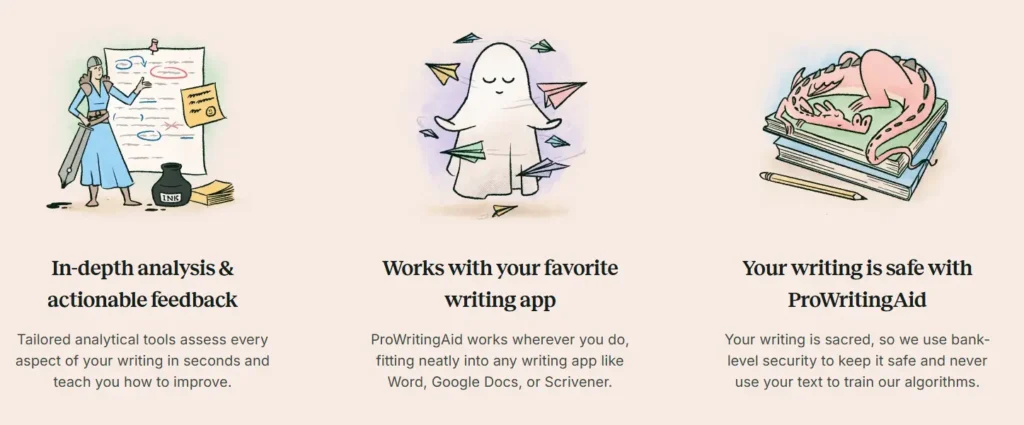
For creative writers, it’s like a smart coach. It spots weak spots early, helping you build stronger narratives.
Free Version Limitations: 500-Word Check Limit, Restricted Daily Report Runs, English-Only, No Mobile App
The free plan limits checks to 500 words each time. You run reports just twice daily, though most types unlock. It works in English alone, with no phone app yet. But a lifetime plan lets you pay once for endless use. Try it free via the link below.
ChatGPT (OpenAI): The Versatile AI Editor and Brainstormer
ChatGPT from OpenAI serves as a flexible Grammarly alternative for all sorts of edits. It rewrites text, sums up docs, and even eyes images for insights. No real-time highlights, but its power shines in chats.
Strengths: Multilingual Capabilities, Data Analysis, Quick Research, and Mobile Access
Use it for fast fact hunts or idea storms in many languages. It crunches data or images on your phone or desk. Paraphrase long bits or build from scratch. Access it anywhere, anytime.
Imagine brainstorming a novel plot while commuting. That’s ChatGPT’s edge over rigid checkers.
Weaknesses: Potential for Factual Errors, No Integrated Plagiarism Checker, and Processing Limits
It might spit out wrong facts, so double-check. No built-in plagiarism scan means extra steps. Limits hit on big files, forcing splits. Still, its broad skills make it a go-to for quick tasks.
Section 3: Tools Built for Academia, Professional Clarity, and Multilingual Needs
Quillbot: Essential for Students and Researchers
Quillbot shines as a Grammarly alternative for schoolwork and deep reads. It rewrites lines, sums up papers, and crafts citations fast. Perfect for essay shine or article breakdowns.
Academic Utility: Breaking Down Dense Articles and Polishing Essays
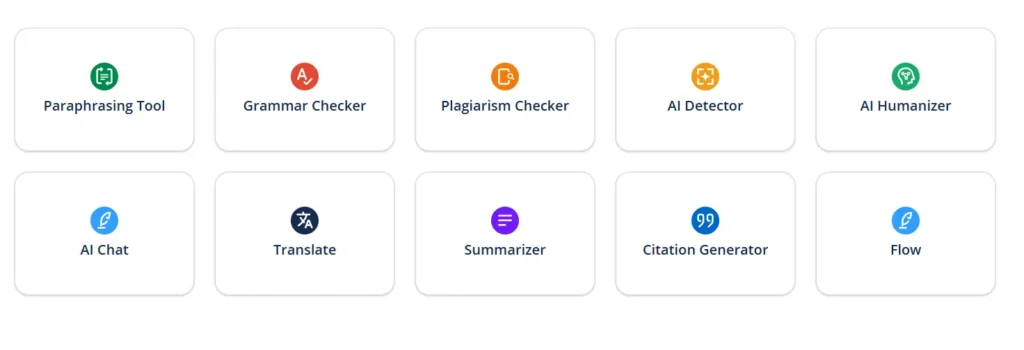
Students love how it simplifies tough texts into clear overviews. Paraphrase to avoid repeats, then add proper refs. It boosts grades by making work crisp and original.
Ever stare at a boring textbook? Quillbot turns it into bite-sized notes, saving hours.
Free Tier Constraints: Strict Limits on Paraphrase Length and Basic Grammar Checks Only
Free users get short rewrites and simple error spots. Deeper features need a paid upgrade. Limits push quick tests, but paid unlocks full power for big projects.
Wordtune: Optimizing Professional Communication
Wordtune fits pros who want clear messages without fluff. As a Grammarly alternative, it offers smart rewrites that fit context. Summarize reports or jot notes on your iPhone.
Key Weakness: Inferior Performance on Deep Grammar Checking and Limited Daily Usage on the Free Plan
It skips heavy grammar dives or style probes. Free plan caps rewrites and sums at a few per day. English-only, it suits quick business tweaks but not full edits.
Like a sharp email editor, it trims fat fast. Yet for detailed feedback, pair it with others.
LanguageTool: The Multilingual Champion
LanguageTool leads as a Grammarly alternative for global writers. It scans grammar, spelling, and tone in over 30 languages. Set goals like formal or casual vibes.
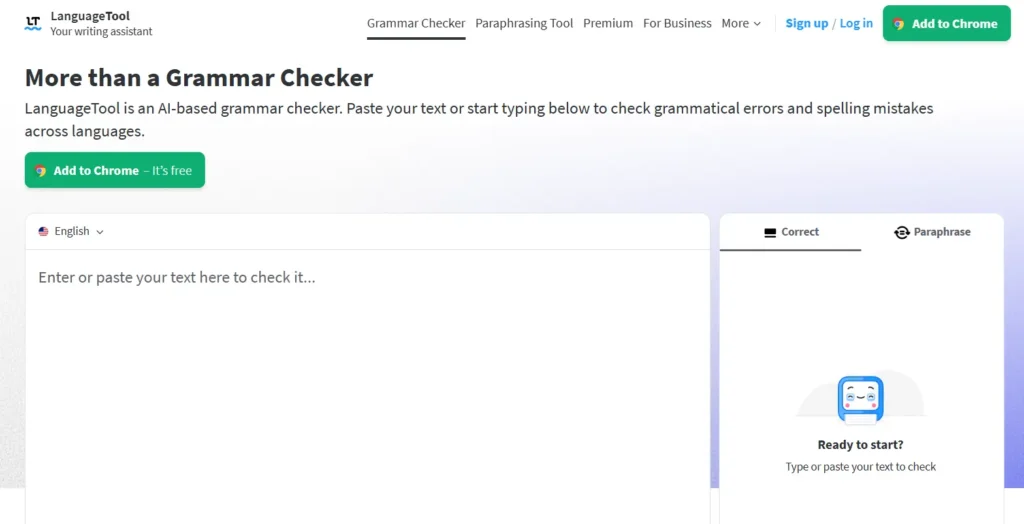
Limitations: Paraphrasing Limited to Single Sentences; No Generative AI or Deep Structural Feedback
Rewrites stick to one line at a time on free. No AI for new content creation. Structural tips stay basic, focusing on surface fixes.
Why wrestle with language barriers? This tool smooths them, letting ideas flow free across borders.
Section 4: Content Generation and Readability Focused Assistants
Rytr Focused on Content Velocity and Brand Voice
rytr acts as a speedy Grammarly alternative for content makers. It generates emails, blogs, or ads in minutes, with some grammar checks. Over 30 languages covered.
Features: Supports 30+ Languages, Includes Plagiarism Checking, Chrome/iOS Support
Built-in plagiarism scan keeps work original. Works on Chrome and iPhone for easy access. Match tones to your brand voice on paid plans.
Crank out posts like a pro factory. It’s built for volume without losing quality.
Free Plan Restrictions: Strict 10,000 Character Monthly Cap; Missing Tone Matching Features. Lack of Android/Firefox/Safari Support
Free hits 10,000 characters a month, cutting off fast. No tone tools or Android app. Skip Firefox or Safari too—stick to supported spots.
Hemingway Editor: Mastering Direct, Clean Prose
Hemingway Editor targets clear writing as a simple Grammarly alternative. It flags passive bits, long sentences, and extras with colors. Readability scores guide fixes.
Missing Functionality: No Generative AI, Free Version Lacks Grammar Checks, Desktop App Requires Separate Purchase, English-Only
No AI for creating text. Web free skips grammar; pay for desktop full version. English focus limits reach, no extensions.
Picture your words as a bold story. Hemingway strips the clutter, leaving punchy prose.
Section 5: Lightweight, Multilingual, and Hybrid Options
Ginger: Comprehensive Multilingual Utility
Ginger software checks and more as a Grammarly alternative. Grammar, rephrasing, text-to-speech, and translation hit over 40 languages. Use on desk or phone.
Platform Availability: Desktop, Mobile, Chrome/Edge Extensions
Extensions fit Chrome and Edge for seamless work. Mobile apps keep edits going on the go.
Drawbacks: Restricted Translation Capabilities on the Free Tier; Lacks Generative AI and Support for Safari/Firefox
Free limits text chunks and translations. No AI creation or Safari help. It covers basics well, though.
Linguix: The Fast, Browser-Based Solution
Linguix offers quick aid as a Grammarly alternative. Grammar, spells, rewrites, translation, and basic AI in one light package. Runs on all big browsers, iOS, Android.
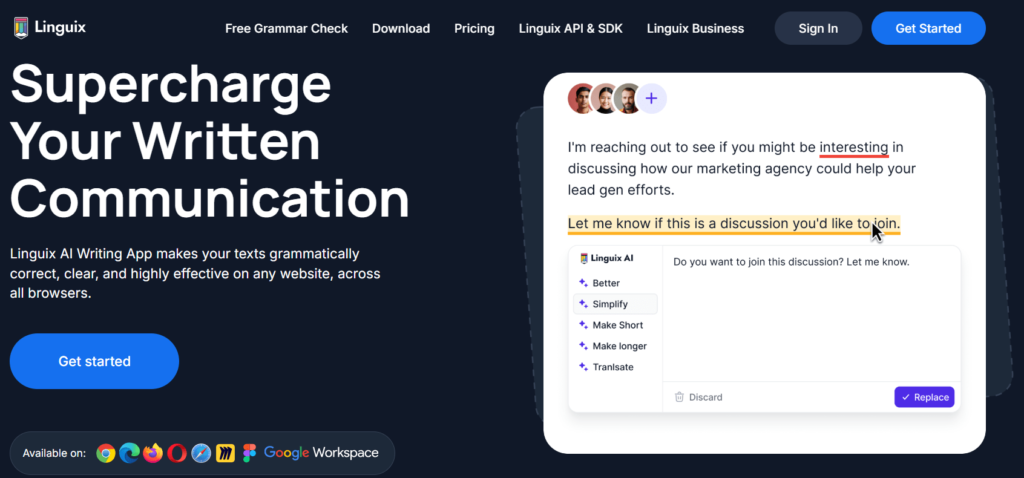
Trade-offs: No Fully Free Version (Trial Available); AI Features Are Not as Advanced; Lacks Plagiarism Checks
Trial only—no endless free ride. AI lags behind giants; no plagiarism tool. Still, it’s zippy for browser fans.
Conclusion: Selecting the Right Writing Partner for Your Workflow
Key Takeaways: Matching Tool to Task
Pick based on your world. Creative types grab ProWriting Aid for privacy and deep tips—no data grabs here. Multilingual needs? LanguageTool handles 30+ tongues with tone tweaks. Hemingway nails clean reads, stripping extras. Students thrive with Quillbot’s essay polish and cites. Each beats Grammarly in spots like lifetime plans or genre focus.
These tools fix Grammarly’s weak points, from costs to privacy. Test them to find your match.
Final Actionable Tip: Try Before You Commit
Start with free trials or tiers to feel the fit. For creative depth and safe data, sign up for ProWriting Aid free at prowritingaid.com. Your writing will thank you—edit smart, write bold.

